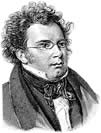late classical (1800 - 1820)
Ludwig van Beethoven
 There is perhaps no composer who is better known and respected by musicians and audiences alike than Ludwig van Beethoven. Beethoven can be seen as the pinnacle of compositional excellence, and his legacy – his symphonies, concertos, string quartets, and piano sonatas in particular – has both inspired and daunted every subsequent composer. His influence will almost certainly be felt for centuries to come.
There is perhaps no composer who is better known and respected by musicians and audiences alike than Ludwig van Beethoven. Beethoven can be seen as the pinnacle of compositional excellence, and his legacy – his symphonies, concertos, string quartets, and piano sonatas in particular – has both inspired and daunted every subsequent composer. His influence will almost certainly be felt for centuries to come.
Gioachino Rossini
Since their inception in the early and mid-nineteenth century, Gioachino Rossini’s operas have been performed time and again and are a staple of the operatic canon. Undoubtedly his most famous work is Il barbiere di Siviglia (The Barber of Seville), closely followed by La Cenerentola (Cinderella) and L’italiana in Algeri (The Italian Girl in Algiers). However, Rossini was a speedy and prolific composer and his legacy includes nearly forty operas. Moreover, his impact as a composer goes beyond the great number of works he wrote. In particular, the demands of his writing, which calls for great vocal agility, have had a lasting effect on the vocal practices of opera singers, and his innovative style and form have influenced generations of opera composers.
Franz Peter Schubert
 An enormously prolific composer despite his tragically short life, Schubert wrote over six hundred songs, nine symphonies, five masses, and numerous piano compositions. Only about twenty-five percent of his compositions had been published at the time of his death, but musicians and audiences nevertheless recognized that Schubert was a remarkable talent. As the poet Franz Grillparzer wrote on the inscription of Schubert’s grave, “The art of music has here entombed a rich treasure but even fairer hopes.”
An enormously prolific composer despite his tragically short life, Schubert wrote over six hundred songs, nine symphonies, five masses, and numerous piano compositions. Only about twenty-five percent of his compositions had been published at the time of his death, but musicians and audiences nevertheless recognized that Schubert was a remarkable talent. As the poet Franz Grillparzer wrote on the inscription of Schubert’s grave, “The art of music has here entombed a rich treasure but even fairer hopes.”
Carl Maria von Weber
 Known for such operas as Die Freischütz and Oberon, Carl Maria von Weber was one of the first composers to create German operas with lasting appeal and influence. Richard Wagner considered Weber’s works an important forebear of his own music dramas. In fact, he once said, “If I had never had the experience of Weber’s things, I believe I should never have become a musician.” Showing his respect for the older composer, Wagner helped arrange for Weber’s remains to be brought from London to Dresden, where Weber was reinterred in 1844.
Known for such operas as Die Freischütz and Oberon, Carl Maria von Weber was one of the first composers to create German operas with lasting appeal and influence. Richard Wagner considered Weber’s works an important forebear of his own music dramas. In fact, he once said, “If I had never had the experience of Weber’s things, I believe I should never have become a musician.” Showing his respect for the older composer, Wagner helped arrange for Weber’s remains to be brought from London to Dresden, where Weber was reinterred in 1844.